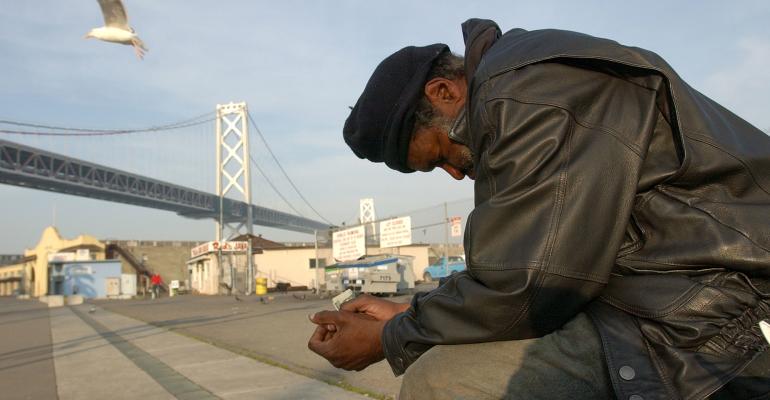(Bloomberg)—A proposed tax on large businesses in San Francisco to help contend with the city’s homelessness epidemic could result in job losses and potentially cause some large employers to move out of the tech-industry hub, according to a report from the city controller’s office.
The tax, which would apply to companies with gross receipts above $50 million if approved by voters in November, would affect up to 400 businesses, the report said. Those in the information and financial services industries would pay nearly half of the $300 million a year that it’s projected to generate.
The controller’s report said the number of potential jobs lost would be small in the context of the city’s large and booming economy, though it could create a impediment to growth. "To the extent that this relocation occurs, economic impacts could be more negative than we project," it said.
The number of homeless on San Francisco’s streets has risen along with the good fortunes of the technology industry’s latest boom, making the city a potent symbol of the economic inequality that’s felt broadly in coastal cities where housing prices are the highest.
The proponents of the tax said that big business has benefited from the federal tax cuts in December, leaving them able to foot the bill for sorely needed services. The controller’s report gave some support to that argument, noting that the new tax would likely be less than what they receive from the federal rollback.
San Franciscans Will Vote on Taxing Companies for Homeless Aid
Funds from the ballot measure would go to housing at least 4,000 homeless people and adding 1,000 beds to shelter over five years, proponents say. Proceeds would also finance mental health and substance abuse facilities and rent subsidies. The rates would range from 0.175 percent to 0.69 percent of the revenue generated in the city. Companies that pay a tax based on payroll rather than gross receipts would face an additional 1.5 percent levy.
The annual per-employee cost in business taxes for affected companies would rise to over $3,700 from $2,500, the controller’s study said. Over 20 years, there would be up to 875 fewer jobs annually than there otherwise would be and the city’s gross domestic product would lose $240 million a year.
The study assumes that there could be positives: the number of homeless would go down and the concurrent increase in the perceived attractiveness of the city could lead to higher hotel rates and property values in retail areas affected by rampant homelessness.
"I support Prop C because it’s a real effort to address quality of life on the streets and keep this city I love working for all of us,” said Tom Collom, co-owner of the Market, a food seller, in an emailed statement.
To contact the reporter on this story: Romy Varghese in San Francisco at [email protected] To contact the editors responsible for this story: James Crombie at [email protected] William Selway, Faris Khan
COPYRIGHT
© 2018 Bloomberg L.P

